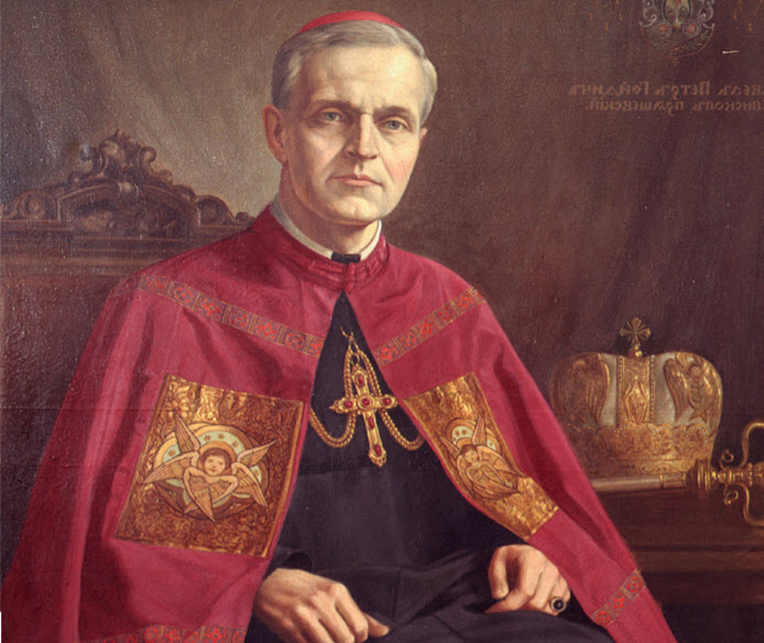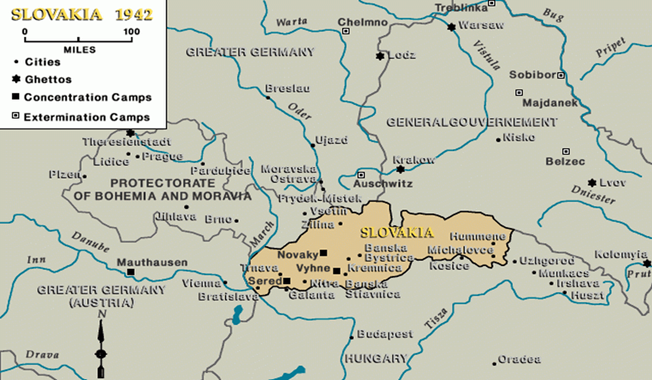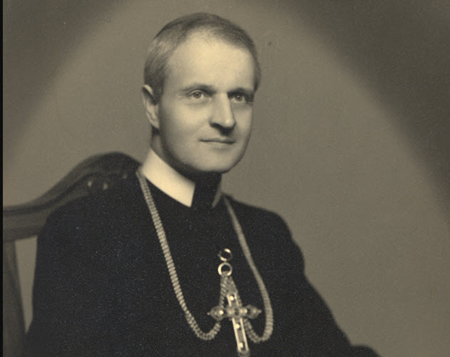A Ruthenian-Ukrainian bishop holds the title of Righteous Among the Nations
This year marks the sixtieth anniversary of the death of Pavlo Petro Goidych (1888–1960), bishop of the Greek Catholic Church of Slovakia and a distinguished religious figure of Ruthenian-Ukrainian background, to whom Israel awarded the title of Righteous Among the Nations.
The future bishop was born into a family of a Ruthenian Greek Catholic priest near the city of Prešov (Priashiv) in eastern Slovakia. Practically his entire range of activities took place in this region, which had a significant population of Ruthenian (Rusyn) Ukrainians. Jewish communities also comprised a notable part of the region’s ethnoconfessional mosaic.
From 1927 Goidych held leading positions in the Prešov eparchy, and in 1940 he became the bishop of this region.
On 25 January 1939, two days after the creation by the Slovak autonomist government of a committee for the “solution to the Jewish question,” the bishop wrote a letter to all the parishes of his eparchy. In his letter, Goidych predicted the catastrophic results of a discriminatory policy against the Jews. Goidych appealed to all priests to protect themselves from the “dangerous epidemic of nationalism, chauvinism, and racism.”
The so-called “Jewish Codex” of Slovakia, a series of regulations that stripped Jews of human and civil rights, was adopted on 9 September 1941. The first transport—a thousand Jewish women from Slovakia—was dispatched from the city of Poprad to Auschwitz on 25 March 1942.
In May 1942, Goidych wrote a letter to the Vatican’s main diplomatic representative in Bratislava, in which he harshly condemned the deportations of Slovak Jews and drew attention to the brutality that the paramilitary organization Hlinka Guard showed toward defenseless Jews.
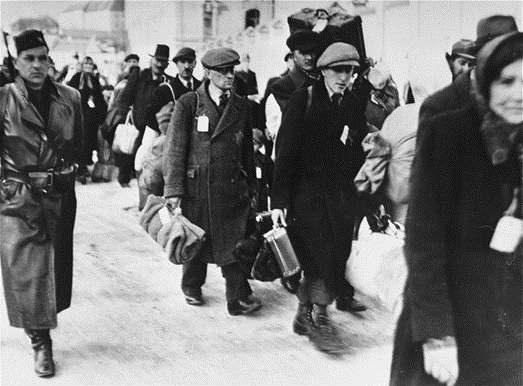
In Goidych’s eyes, the crimes being committed against the Jews of Slovakia were undermining the foundations of the Church because the state was headed by a Catholic priest, President Jozef Tiso.
Bishop Goidych requested the Vatican to compel President Tiso of the Slovak Republic to halt the atrocities being perpetrated against the Jews, and “if this is impossible, the Holy See should appeal to the president to resign from his current position,” so that these inhumane acts would not disgrace the entire Catholic Church.
However, the Vatican did not condemn Tiso and did not urge him to resign. The deportations of Jews to the gas chambers in Auschwitz continued at full steam. Moreover, for the deportation of each Jew, the Slovak government paid Germany five hundred Reichsmarks. In August 1942, Slovakia’s political police reported on Goidych’s meeting with Jews in Michalovce. He exchanged kisses with them, an action that supposedly irked Christian eyewitnesses.
Pavol Lukáč Shpitser, a Jewish businessman from the city of Poprad, met with Bishop Goidych on a street in Prešov at the very moment that members of the Hlinka Guard were capturing Jews. The bishop embraced his companion and protected him from being detained.
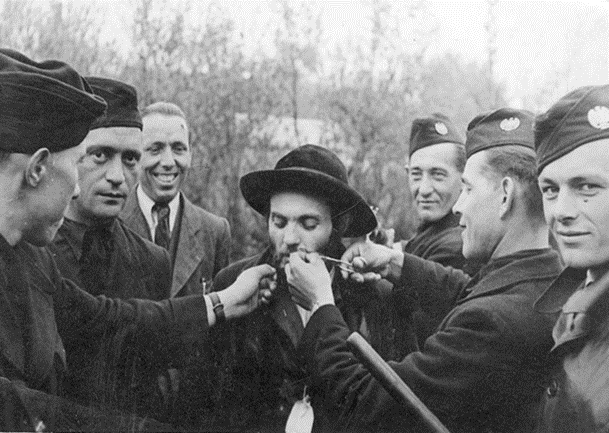
On 26 October 1942, the Slovak security services informed the Ministry of Internal Affairs about a large number of fictitious baptisms performed by Bishop Goidych. The report describes several cases where a single member of a Jewish family converted to Christianity in order to protect other family members. In this way, 533 Jews converted to the Greek Catholic or Orthodox faith in order to save nearly fifteen hundred family members who were not baptized; the majority of the converts continued to practice Judaism openly or in secret.
The last echelon to transport Slovak Jews to the death camp departed on 20 October 1944. Nearly seventy thousand Slovak Jews were killed during these deportations. Only a few hundred local Jews were left alive after the war.
The expulsion of the Nazis did not bring peace and quiet to this land. The communist regime, which was established in Czechoslovakia in the late 1940s, launched repressions against their ideological opponents. A bogus trial of three bishops, accused of maintaining “enemy links” with the Vatican and aiding the Nazi regime, was held in 1951. All three, including Goidych, were sentenced to life imprisonment.
From prison, Goidych wrote to the president of the Czechoslovak Republic, requesting that his sentence be commuted, refuting the accusations of collaboration with the Nazis by declaring that he had rescued Jews.
“During the German occupation, Jews came to me en masse not only from Prešov but from other cities as well.... I did not refuse help to a single one of them, I placed their children in our eparchial institutions; in every possible way I hid their money and gold valuables, in order to save them from confiscation,” the prisoner emphasized in his letter to the head of state. Goidych appended the surnames of several Jewish families from various cities in Slovakia who could corroborate his words.
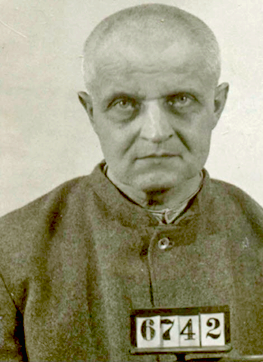
Jews sent their testimonies in favor of the bishop, but all these efforts were in vain. The communist regime turned a deaf ear to the prisoner’s requests. The martyr-bishop died in prison at the age of 72 on 17 July 1960.
According to Ivan Hvat, a Ukrainian-Slovak journalist, the bishop also encouraged his priests to help Jews. Thus, Rev. Mashlei, the parish priest in the village of Oľšavica, obeying Goidych, saved fifty-four Jewish families, whom he hid among his peasant parishioners.
Pope Paul II beatified Bishop Goidych on 4 November 2001.
The search for Jewish witnesses for Yad Vashem, the World Holocaust Remembrance Center in Israel, began in 2006. It turned out that Pavlo Goidych personally saved the lives of at least twenty-seven Jews by issuing them baptismal certificates and hiding them in Greek Catholic monasteries. In 2007 Yad Vashem awarded Goidych the title of Righteous Among the Nations.
Rabbi Misha Kapustin, the rabbi of the Federation of Jewish Communities in the Slovak Republic, explained his attitude to the personality and feat of Bishop Goidych in a comment offered to Ukrainian Jewish Encounter: “Bishop P. P. Goidych is an important name for the Jews of Slovakia, a symbol of rescuers of Jews during the Holocaust. He made his choice clearly, like Metropolitan Andrei Sheptytsky, preserving life over death. Their noble efforts should be recognized and known not only by all Jews but, above all, by the whole of mankind, as a symbol of how to remain a human being in a brutal and unjust world.”
Where the Sheptytsky brothers are concerned, there are similarities in the tragic fates of two Ukrainian Righteous Among the Nations: Bishop Pavlo Petro Goidych and Archimandrite Klymentii Sheptytsky (1869–1951). During the Second World War, both men, risking their lives, saved Jews. Both were arrested and sentenced by the communist authorities, after being tortured and brutally interrogated. And both of them, with their ideals intact, died in prison, unbroken to the end.
Text: Shimon Briman (Israel)
Photos: Official websites of the National Memory Institute (Slovakia), Yad Vashem (Israel), and the United States Holocaust Memorial Museum
Translated from the Ukrainian by Marta D. Olynyk.
Edited by Peter Bejger.







